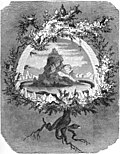Völuspá (also Vǫluspá, Vǫlospá, or Vǫluspǫ́; Old Norse: 'Prophecy of the völva, a seeress') is the best known poem of the Poetic Edda. It dates back to...
14 KB (1,625 words) - 09:31, 13 November 2024
Völuspá hin skamma (Old Norse: 'The Short Völuspá) is an Old Norse poem which survives as a handful of stanzas in Hyndluljóð, in the Poetic Edda, and...
3 KB (229 words) - 23:26, 31 January 2024
monsters born of Loki and a jötunn may be of greater age. In Völuspá hin skamma (Short Völuspá; a poem of Hyndluljóð), Angrboða is mentioned as the mate...
7 KB (835 words) - 19:46, 24 September 2024
accompanied by ravens, and sometimes connected to swans. The Old Norse poems Völuspá, Grímnismál, Darraðarljóð, and the Nafnaþulur section of the Prose Edda...
11 KB (552 words) - 00:34, 2 July 2024
Hati's mother is the giantess, not named but mentioned in the Eddic poem "Völuspá", who dwells to the east of Midgard in the forest of Járnviðr ("Ironwood")...
4 KB (387 words) - 22:50, 19 March 2024
Svaðilfari (section Völuspá hin skamma)
folklore Simek 2008, p. 305. Orchard 1997, p. 156. Völuspá in skamma (ON), Stanza 11. Bellows 2004, Völuspa in skamma, stanza 11. Faulkes 1987. Gylfaginning...
5 KB (442 words) - 11:23, 9 November 2024
of Níðhǫggr seems to come from two of the Eddic poems: Grímnismál and Völuspá. Later in Skáldskaparmál, Snorri includes Níðhǫggr in a list of various...
9 KB (805 words) - 18:15, 25 October 2024







